3 Main Benefits Of Apple Cider Vinegar For The Skin Simplified
Have you ever heard of the natural wonders that apple cider vinegar can do for your skin? Apple cider vinegar is a powerful, all-natural remedy with many amazing benefits. It has been used as a health tonic and skincare treatment since ancient times, and it continues to be an effective solution today.
What exactly are the benefits of apple cider vinegar for the skin, you may wonder? From reducing wrinkles to eliminating acne, there are countless ways in which this simple ingredient can help improve the appearance and health of your skin. Read on to discover some of these incredible benefits!
What Is Apple Cider Vinegar?
Apple cider vinegar is a type of vinegar made from fermented apple juice. The fermentation process gives it its deep brown color and sour taste.
It has been used for centuries as an ingredient in sauces, dressings, and pickles, but now it’s become popular as a health supplement due to its many potential benefits, such as helping with weight loss, lowering cholesterol levels, and reducing inflammation.
Sources and Forms of Apple Cider Vinegar
Apple cider vinegar can be derived from apples or other fruits like grapes, peaches, and apricots. The process of making apple cider vinegar involves crushing the fruit to extract the juice, which is then fermented twice, once with yeast to create alcohol and then again with bacteria to form acetic acid. This acetic acid gives the final product its sour taste as well as potential health benefits.
There are different sources and forms of ACV that can be used for skincare, including:
- Raw, unfiltered, organic apple cider vinegar: This type of ACV is made from organic apples that are crushed and fermented to create the vinegar. It contains the “mother,” a cloudy, cobweb-like substance that forms naturally during fermentation. This type of ACV is preferred for skincare as it contains more beneficial bacteria and enzymes.
- Filtered apple cider vinegar: This type of ACV is clear and does not contain the “mother.” It is usually pasteurized, which means that it has been heated to kill off any bacteria or enzymes. While filtered ACV can be used for skincare; it may not be as effective as raw, unfiltered ACV.
- Apple cider vinegar pills or capsules: These are supplements that contain ACV in powdered or liquid form. While they can be convenient to use, they may not be as effective as using ACV topically on the skin.
To use ACV for skincare, it can be diluted with water in a ratio of 1:1 or 1:2, depending on skin sensitivity. ACV can be used as a toner, facial mist, or added to a bath.
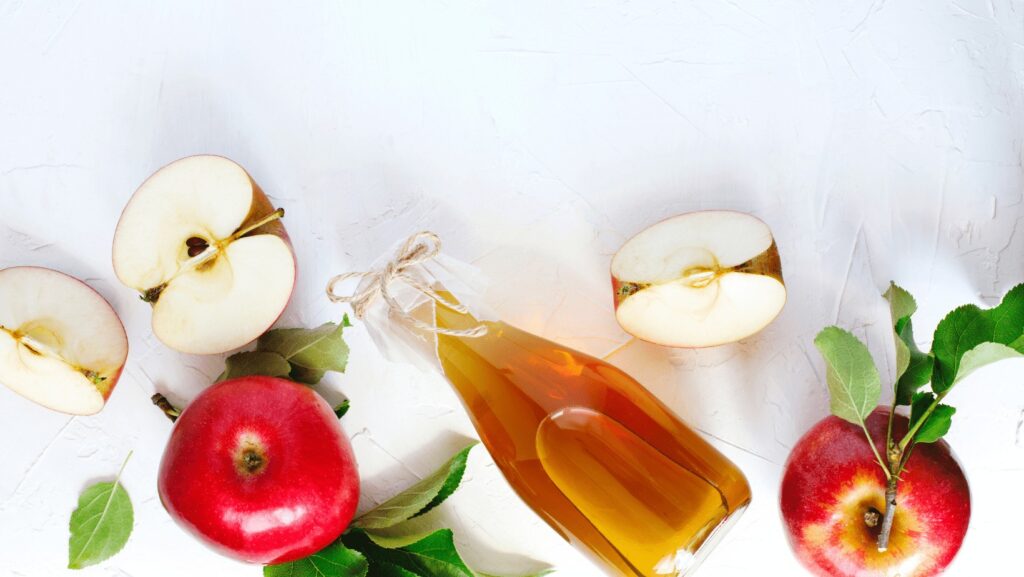
Benefits Of Apple Cider Vinegar For The Skin
Apple cider vinegar (ACV) is a popular home remedy for various skin concerns. Acetic acid is the main active ingredient in ACV which gives it many potential benefits.
There are many possible ways ACV can be used to improve the health of the skin, such as reducing acne, evening out skin tone, fighting wrinkles and age spots, and improving overall complexion.
Acne-Fighting Properties
Acne is one of the most common skin issues that many people face, and ACV can be a great natural remedy to help reduce or even eliminate it. The acidity of ACV helps to kill off any bacteria on your skin that could be causing acne breakouts.
Mixing equal parts of ACV and water and applying it directly to your skin as an astringent can help reduce inflammation associated with acne-causing bacteria and dry up existing blemishes. Doing this once or twice a day should give you noticeable results in no time.
Brightening Properties
For those looking to brighten their complexion, applying raw apple cider vinegar directly onto the face can help even out discoloration in the skin caused by sun exposure, aging, or other environmental factors.
The acids present in ACV work to gently exfoliate the surface layer of your skin, removing dead cells and revealing more youthful-looking layers beneath. Doing this regularly will result in brighter, more evenly toned skin over time.
Anti-Aging Properties
Another great benefit of using ACV on your skin is its ability to combat wrinkles and age spots. The antioxidants present in ACV help fight free radicals that cause premature aging of your skin cells.
You can mix equal parts water with some organic ACV and apply it directly onto targeted areas of your face or body where wrinkles are present as an overnight treatment. This will help plump up wrinkled areas while also providing essential hydration for healthier-looking skin overall.
Additionally, if you have age spots that you would like to lighten up naturally, you can use diluted apple cider vinegar as a topical treatment on these areas daily until desired results are achieved.
So, what does apple cider vinegar do? Overall, countless benefits come from using apple cider vinegar for skincare purposes. Its antibacterial properties make it an ideal remedy for treating breakouts, while its antioxidant content helps fight signs of aging like wrinkles and age spots for a smoother-looking complexion over time without drying out your skin too much as some conventional treatments do.
If you’re looking for a natural alternative to treat any skincare concern without having harsh chemicals penetrate into your pores, then apple cider vinegar should definitely be at the top of your list!
How Do You Use Apple Cider Vinegar On Your Face?
Apple cider vinegar is an excellent natural remedy for many skin ailments. It can be used as a toner, cleanser, or spot treatment to help clear acne and reduce inflammation. To use it on your skin, mix equal parts apple cider vinegar and filtered water in a bowl.
Then dab the mixture onto the affected areas using a cotton ball or pad and let sit for 10-15 minutes before rinsing off with lukewarm water. Afterward, you may want to apply some moisturizer to prevent your skin from drying out too much.
The Best Skincare Products With Apple Cider Vinegar
There are a number of skincare products that contain apple cider vinegar as an active ingredient. Here are some of the best:
- The Inkey List Apple Cider Vinegar Acid Peel: This acid peel contains 10% AHAs and BHAs and apple cider vinegar to exfoliate and brighten the skin.
- Farmacy Deep Sweep 2% BHA Pore Cleaning Toner: This toner contains 2% salicylic acid and apple cider vinegar to exfoliate and clarify the skin while also reducing the appearance of pores.
- Peter Thomas Roth Acne Clearing Wash: This face wash contains 2% salicylic acid, apple cider vinegar, and allantoin to unclog pores, remove excess oil, and soothe irritated skin.
- Biossance 100% Squalane Oil: This oil contains tea tree oil and apple cider vinegar to target acne and balance the skin’s oil production.
- Herbivore Botanicals Blue Tansy Resurfacing Clarity Mask: This mask contains white willow bark, fruit enzymes, and blue tansy oil, as well as apple cider vinegar, to exfoliate and clarify the skin while also soothing and balancing the complexion.
When using skincare products with apple cider vinegar, it’s important to patch test first and follow the directions carefully. ACV can be irritating to some people, so it’s best to start with a small amount and gradually increase use over time.
Drinking Apple Cider Vinegar For Glowing Skin
Drinking apple cider vinegar (ACV) has been touted as a natural way to improve skin health and promote a glowing complexion. While limited scientific evidence supports the claim that drinking ACV can improve skin health, some people have reported positive results. Here’s how to drink apple cider vinegar for skin and what you need to know:
- ACV is acidic, so it should be diluted before drinking. A common ratio is 1-2 tablespoons of ACV diluted in a glass of water. Drinking undiluted ACV can damage the tooth enamel and irritate the throat.
- ACV can help balance the body’s pH, which is important for healthy skin. It is believed that drinking ACV can help promote a more alkaline environment in the body, which can reduce inflammation and improve skin health.
- While drinking ACV may have some potential benefits for skin health, it’s important to note that it is not a cure-all and should not be relied on as the sole solution for skin concerns.
It’s always a good idea to talk to a healthcare provider before starting any new supplement or dietary regimen, especially if you have any underlying health conditions or are taking medications.
Additionally, maintaining a healthy diet, staying hydrated, and practicing good skincare habits are important for promoting healthy, glowing skin.
Getting The Most Out of Apple Cider Vinegar For The Skin
Apple cider vinegar is an excellent natural treatment for many skin conditions. It can help to reduce inflammation and redness, tighten pores, even out your skin tone, and add a healthy glow.
To get the most from this treatment, it’s best to use raw organic apple cider vinegar that contains “the mother” – the living enzymes which provide the beneficial properties of ACV.
Dilute up to 1 part ACV with 2 parts water before applying it directly onto the skin or adding it to a face mask. Depending on your desired outcome, you may also want to mix in other ingredients, such as honey or essential oils.

Potential Side Effects Of Apple Cider Vinegar On Face
Using apple cider vinegar, while it has many benefits for our health and skin, can also have some unwanted side effects. One of the most common is that it can cause dryness or irritation when applied directly to the skin as its acidity level is high.
It’s important to dilute apple cider vinegar with water before applying it topically in order to reduce this risk of irritation. Additionally, you should avoid getting the mixture into any cuts or open wounds as it may sting and could lead to further infection if not carefully monitored.
Alternatives To Using Apple Cider Vinegar On The Skin
Apple cider vinegar is a great natural remedy for many skin issues. However, it can be too strong for some people’s sensitive skin. If this is the case, there are plenty of alternatives to using apple cider vinegar on the skin.
For example, honey, aloe vera, or chamomile tea can all be used as an anti-inflammatory agent; cucumber juice and yogurt can help hydrate and nourish the skin; green tea helps reduce redness and irritation; witch hazel helps soothe itching or burning sensations.
With these alternative uses, you won’t have to worry about any side effects from using apple cider vinegar on your delicate face.
Conclusion On What Does Apple Cider Vinegar Do
Apple cider vinegar has a number of potential benefits for the skin. Its antibacterial, antifungal and acidic properties can help exfoliate, clarify, and balance the skin, while its antioxidants can protect against free radical damage and premature aging.
ACV can be used in a variety of skincare products, including toners, masks, and cleansers, and can also be consumed in diluted form to promote a healthy, glowing complexion.
However, it’s important to remember that ACV is not a cure-all and should be used in moderation, as it can be irritating to some skin types.
As with any new skincare product or regimen, it’s always a good idea to consult with a healthcare professional or dermatologist to ensure that it is safe and effective for your individual needs. With the right approach and usage, apple cider vinegar can be a valuable addition to your skincare routine.
FAQ

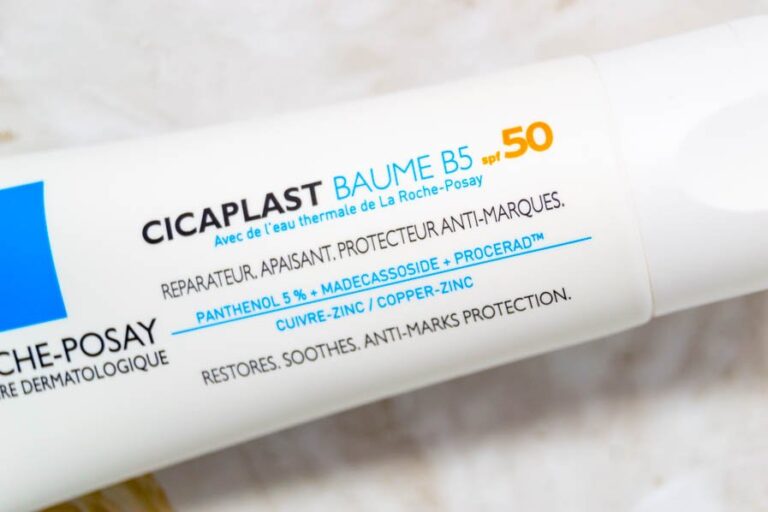


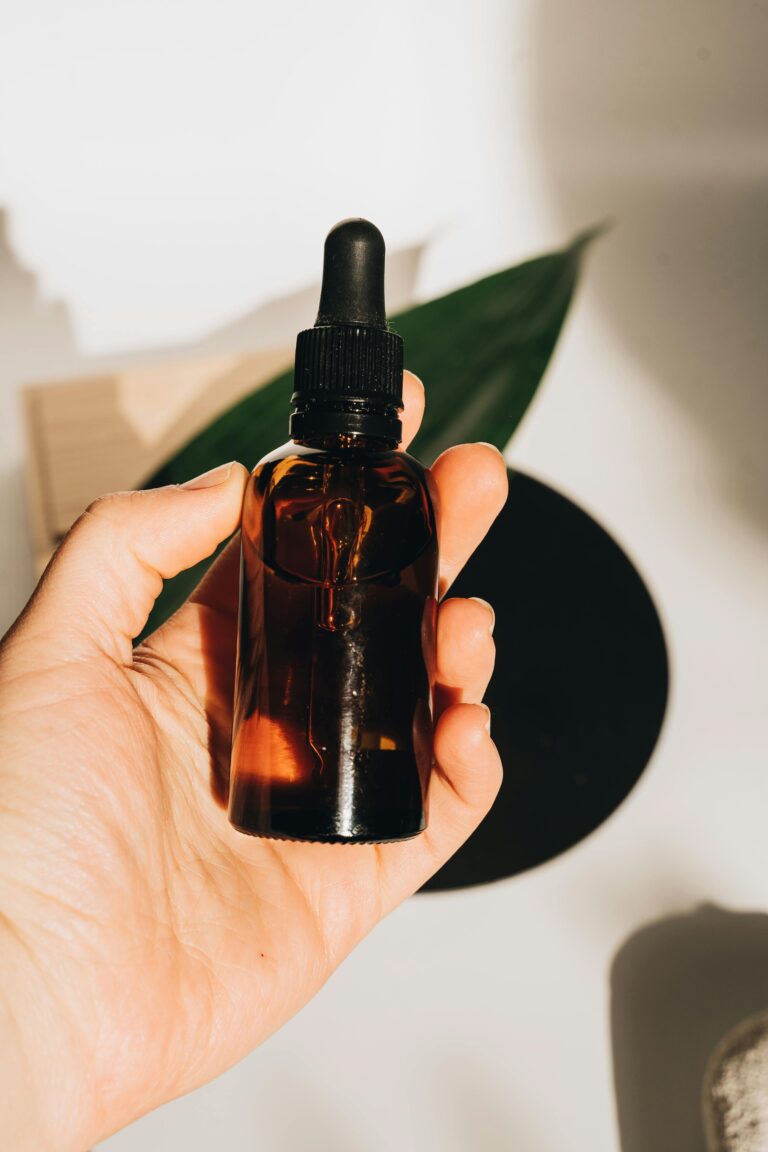
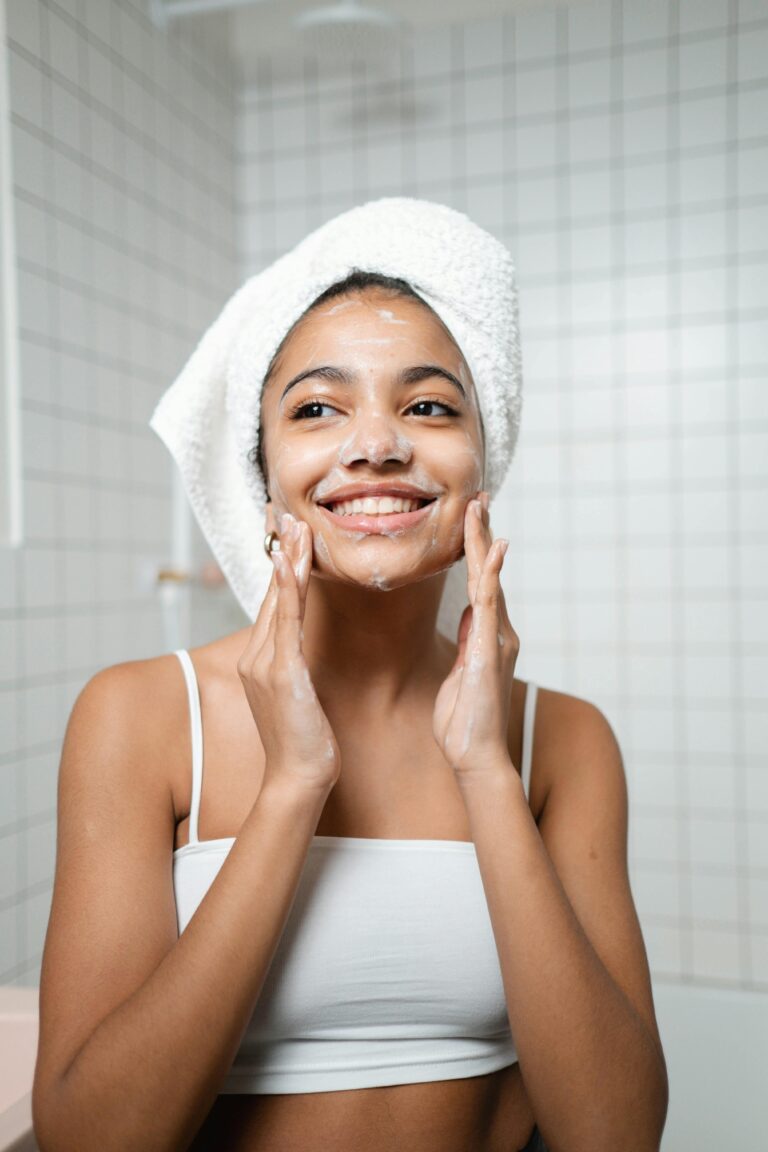
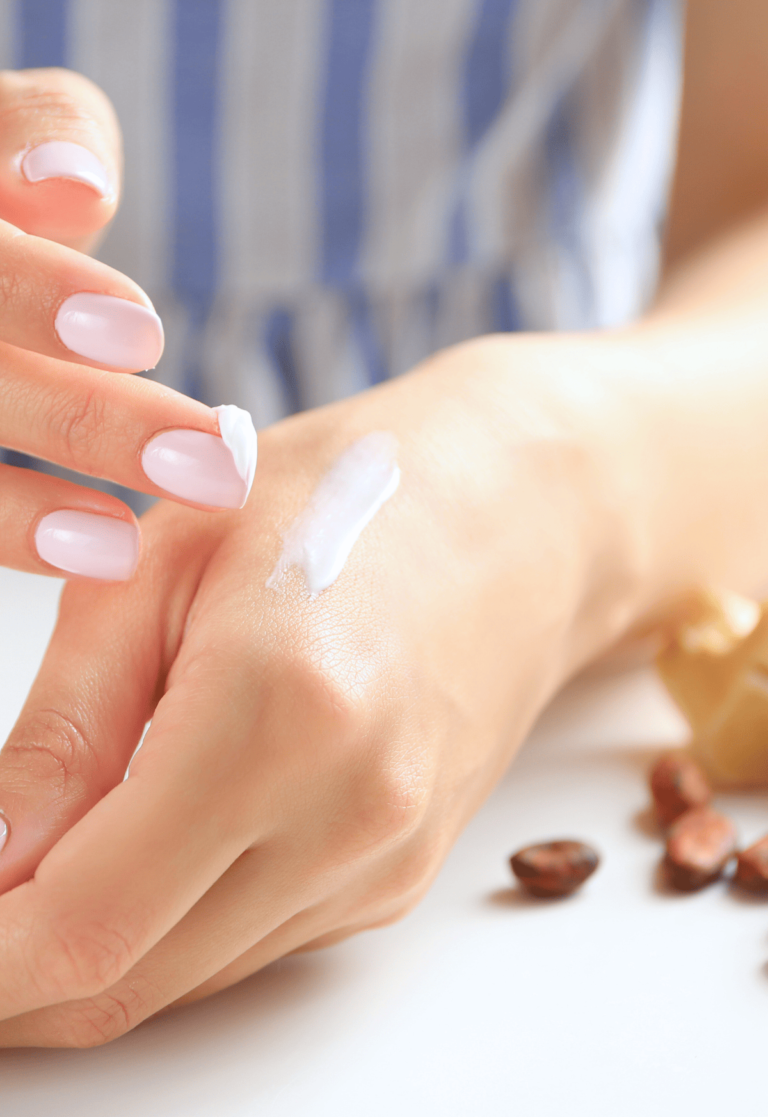
One Comment